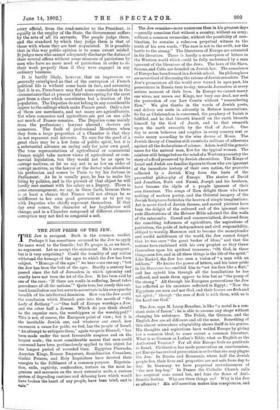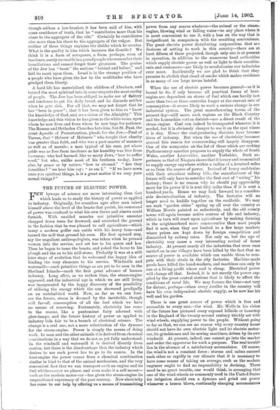THE JUST PRIDE OF THE JEW.
THE Jew is arrogant. Such is the common verdict. Perhaps it has sometimes occurred to the Jew to apply the same word to the Gentile ; but Tu quoque is, as we know, no argument. Let us accept the statement. He is arrogant ; but is it very surprising P Could the humility of any nation withstand the homage of the ages to which the Jew has been subject. "Homage of the ages !" we hear some one say; "but the Jew has been the butt of the ages. Hardly a century has passed since the fall of Jerusalem in which ignominy and cruelty have not been the lot of the Jew. It has been said by one of the raze: 'If there are ranks in suffering, Israel takes precedence of all the nations.' " Quite true, but surely this out- ward humiliation can but serve to accentuate in his own eyes the breadth of his intellectual dominion. How can the Jew avoid the conclusion which Disraeli puts into the mouth of "the Lady of Bethany" :—" One half of Europe worships a Jew, and the other half a Jewess. Which do you think should be the superior race, the worshippers or the worshipped?" This is not, of course, the European point of view; but it is the inevitable Jewish one, and whatever our creed, how enormous a cause for pride, we feel, has the people of Israel. "An attempt to extirpate them," again we quote Disraeli, "has been made under the most favourable auspices and on the largest scale ; the most considerable means that man could command have been pertinaciously applied to this object for the longest period of recorded time. Egyptian Pharaohs, Assyrian Kings, Roman Emperors, Scandinavian Crusaders, Gothic Princes, and Holy Inquisitors have devoted their energies to the fulfilment of a common purpose. Expatria- tion, exile, captivity, confiscation, torture on the most in- genious and massacre on the most extensive scale, a curious system of degrading customs and debasing laws which would have broken the heart of any people, have been tried, and in vain." The Jew remains—more numerous than in his greatest days —proudly conscious that without a country, without an army,
without a common vernacular, without the possibility of com- bination, he remains a ruler,—a perpetual witness to the truth of his own words, "The race is not to the swift, nor the battle to the strong." The literatures of Europe are saturated in his literature. There is hardly a masterpiece of letters in the Western world which could be fully understood by a man ignorant of the literature of the Jews. The laws of the Slays, Saxons, and Celts are founded on Jewish law. The conscience of Europe has been formed in a Jewish school. Its philosophers are never tired of discussing the axioms of Jewish moralists. The Jew's persecutors all the world over turned in ages past, his persecutors in Russia turn to-day, towards Jerusalem at every
serious moment of their lives. In Europe we cannot marry our wives, nor crown our Kings, nor bury our dead, nor seek the protection of our Law Courts without "remembering Zion." We give thanks in the words of Jewish poets, and deliver our souls in adversity in Hebrew lamentations. So far as Christendom is concerned, the prophecy of Isaiah is fulfilled, and he that blesseth himself on the earth blesseth himself by the God of Jacob, and he that sweareth upon the earth sweareth by the God of Jacob. One day in seven believers and sceptics in every country rest or make merry according to the wise decree of Moses. The Jewish theory of Creation still counts its millions of adherents against all the declarations of science. Adam is still the generic name for the natural man, Eve for the typical woman. The rainbow still brings before the mind of a Western peasantry the story of a flood preserved by Jewish chroniclers. The Kings of Israel and Judah are familiar figures to those who are ignorant of the immediate history of their own nation, the proverbs collected by a Jewish King form the basis of the proverbial philosophy of Europe. The stories of David and Jonathan, Ruth and Naomi, Joseph and his brethren, have become the idy1h3 of a people ignorant of their own literature. The songs of Zion delight those who know nothing of modern poetry, and the Oriental imagery of the Jewish Scriptures furnishes the heaven of simple imaginations. Art is never tired of Jewish themes, and sacred pictures have been the delight of the cultured and of the ignorant since rude illustrations of the Hebrew Bible adorned the dim walls of the catacombs. Cowed and commercialised, divorced from the ennobling influences of agriculture, the aspirations of patriotism, the pride of independence and civil responsibility, obliged to worship Mammon and to become the moneylender and sordid middleman of the world, the Jew cannot forget that he was once "the great broker of ideas," and that the nations have exclaimed with his own prophet as' they threw themselves upon his spiritual treasures : "Oh God, in these things men live, and in all these things is the life of the spirit." Like Ezekiel, the Jew has seen a vision of "a man with an inkhorn." He knows the power of letters, and his inner pride in his literature has enabled him to "set his face like a flint," and has upheld him through all the humiliations he has suffered, and made them appear to him but as "the pomp of the strong." All through his European persecutions the Jew has reflected as his ancestors reflected in Egypt : "Now the Egyptians are men and not God, and their horses are flesh and not spirit ; " though "the arm of flesh is with them, with us is the Lord our God."
The Jew, says M. Leroy-Beaulieu, is like "a metal in a con- stant state of fusion": he is able to assume any shape without changing his substance. The Polish, the German, and the English Jew are all different and all the same. Something of this almost miraculous adaptability shows itself in his genius. His thoughts and aspirations have welded Europe by giving her a common ideal, to some extent a common literature. What is so German as Luther's Bible, what so English as the Authorised Version ? For all this Europe feels no gratitude to Israel. Civilisation has made persecution an anachronism, yet Europe has revived persecution in order that she may plague the Jew. In Russia and Roumania, where half the Jewish people live, their lives and properties are not safe from day to day. In Germany we have perpetual recrudescences of "the new hep-hep." In France the Catholic Church calls her sceptical sons round her, and fans the flame of Anti- Semitic feeling. Why are these things so ? Why is the Jew so offensive? His self-assertion makes him conspicuous, and
though seldom a law-breaker, it has been said of him, with some semblance of truth, that he "contributes more than his share to the aggregate of the vile." Certainly he contributes also more than his share to the aggregate of the vulgar. But neither of these things explains the dislike which he creates. What is the quality in him which incenses the Gentile ? We think it is a form of arrogance, a form, perhaps, even of insolence, surely excusable in a proud people who remember their humiliations and cannot forget their greatness. The genius of the Jew has "beset" the nations "behind and before," and laid its mark upon them. Israel is in the strange position of a people who have given the law to the multitudes who have grudged them liberty.
A hard life has materialised the children of Abraham, and turned the most spiritual into in some respects the most earthy of people. The Jew has been obliged to make use of flattery and insolence to get his daily bread, and he discards neither when be gets rich. For all that, we may not forget that he has "been in grace" ; that it has been given to him to "know the knowledge of God, and see a vision of the Almighty." This knowledge and this vision he has given to the white races, upon whom he now lives and from whom he now begs for patience. The Roman and Orthodox Churches hate him, but St. Paul, the great Apostle of Protestantism, pleads for the Jew,—Paul of Tarsus, that "Hebrew of Hebrews" who taught that charity was greater than faith, and who was a past-master of manners as well as of morals ; a man typical of his race, yet whose pride was as free from insolence as his humility was free from baseness; who had learned, like so many Jews," how to suffer need," but who, unlike most of his brethren to-day, knew also, by grace or by nature, "how to abound." "Are they Israelites ? "we hear him say; "so am I." "If we have sown unto pan spiritual things, is it a great matter if we reap your carnal things ? "











































 Previous page
Previous page